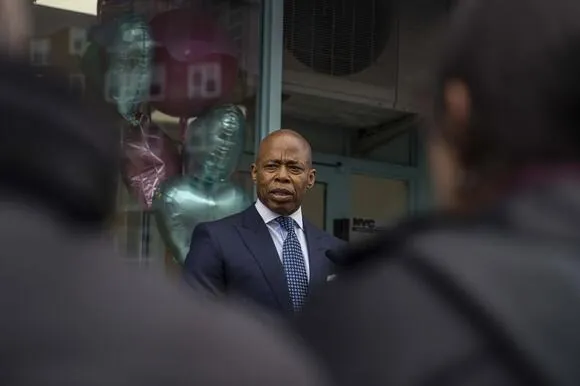Mayor Eric Adams spoke at a community conversation in a high school located in Southeast Queens, close to his childhood home. He swiftly moved from pleasantries to expressing his grievances, highlighting the indignities he has faced. He went on to criticize his critics, although he did not name them.
One stands out.
Adams referred to the criticism of his handling of the migrant crisis as despicable and highlighted what he found most troubling. In particular, he expressed dissatisfaction with the comptroller of the City of New York, who criticized the administration’s efforts and accused them of being anti-immigrant.
Adams criticized his fellow citywide leaders for not taking action and instead resorting to tweeting. He used a familiar taunt he’s used before against the comptroller and others, telling them to “get their ass out on the streets.”
Most New York City mayors are sensitive and confrontational when faced with criticism, and Eric Adams is no exception. However, Adams differs from other mayors in that he openly and unnecessarily shares his grievances, despite claiming otherwise.
The mayor responded disrespectfully to his critics. He compared a housing activist who challenged his support for a rent increase to a plantation owner. Additionally, when asked to address criticism from the comptroller, he imitated his voice in a nasal tone and accused him of wanting to be the “shadow mayor.”
Earlier this year, he referred to Curtis Sliwa, the Republican he defeated in the general election, as a “buffoon” following Sliwa’s arrest during a protest against the city’s use of shelters for recent migrant arrivals.
Adams called the protester who disrupted the mayor’s rally, a “fool.”
Critics slammed the mayor last week for not providing a timely warning about the approaching major storm. As a result, many New Yorkers were caught off guard, leaving them unprepared for the severe flooding that inundated parts of the city and led to the suspension of half the subway system.
He rejected blame abruptly, stating, “If someone was caught off guard, they must have been living under a rock.”
Many mayors, including Edward Koch and Rudy Giuliani, have taken combative stances when faced with criticism. Even Michael Bloomberg and Bill de Blasio, who are less outwardly pugnacious, have been known to brusquely dismiss their critics. Adams is simply following a long-standing tradition among mayors.
Eric Phillips, former press secretary for de Blasio, believes that every elected mayor expects to have a thick skin. However, the reality is that constant criticism, whether fair or not, is unavoidable and can quickly wear down even the toughest individuals from all walks of life.
Adams, however, claims to have a thick skin. He often states, “my haters become my waiters when I sit down at the table of success.”
He clarifies that his remarks have been misinterpreted. For instance, when he referred to Sliwa as a buffoon, he was simply defining the term.
Last month, the mayor stated that he welcomes criticism and shared a quote that resonates with him: “What God has intended for you, no one can take away. What God has not intended for you, no one can give.” He added that he has faced criticism throughout his life.
As a volunteer at Safety Net Activists, a nonprofit dedicated to fighting evictions, Charisma White disagrees with the mayor’s self-assessment. She recently confronted Adams as he was leaving a public appearance, questioning why he vetoed a package of bills that aimed to make it easier for at-risk New Yorkers to obtain housing vouchers.
White and Adams had a heated discussion that was abruptly ended by the mayor, who claimed he was being talked over. When White asked about further discussion, the mayor replied that they wouldn’t be meeting.
In a follow-up interview, White emphasized that the mayor should listen to the residents and communicate with them more professionally. “He’s not connecting with us on a personal level,” she stated.
The administration’s position on enhancing safety for pedestrians and cyclists on McGuinness Boulevard in Greenpoint was criticized by Brooklyn council member, Lincoln Restler. In response to a question about the plan, the mayor asked, “Who’s the local councilman?”
With a chuckle, he responded, “Sure, what else would you like to know?” when informed that it was Restler.
Last week, Adams fired Restler after a TV interview where it was revealed that the council member was left in shock due to the lack of communication from City Hall before the storm.
“With a smile, the mayor referred to Lincoln Restler as the source of many opinions.”
Restler doesn’t understand why the mayor publicly expresses his dislike towards him.
Restler suggested asking him, but he believed that the city was not being governed with the necessary rigor and confidence that New Yorkers deserve.
In a statement, Lander acknowledged that city comptrollers often create tension with mayors due to their responsibility of monitoring the city’s financial well-being and overall progress. He stated, “There is always some friction between the two positions, and this is unlikely to change.”
In an interview with NY1, Adams revealed that his late mother imparted an important piece of advice to him – “Don’t ever let anyone disrespect you.” He further added that he would not tolerate what he perceives as unjust criticism or disrespect.
The mayor’s responses often include a common theme – he lectures the press corps on respect when reporters shout questions at him during news conferences.
The woman, whom the mayor compared to a plantation owner, disrupted the meeting, skipped others waiting to speak before her, and spoke disrespectfully when given the chance to speak. The mayor criticized her behavior as being out of line.
During the community conversation in Queens, Adams claimed that his administration was unpopular because of its diversity. This is a common statement made by the mayor.
Adams likened himself to Kunta Kinte, the enslaved African protagonist in the novel and miniseries “Roots.” In a memorable scene, Kunta Kinte was whipped until he accepted the name Toby.
Adams spoke at City Hall during a Juneteenth celebration where he expressed that despite reading articles every day, he refuses to conform and abandon his roots. He declared, “You may think you can change me from Kunta Kinte to Toby, but Kunta Kinte is all I know.”
During the National Urban League conference in Houston last July, Adams stated that Black leaders often avoid responding assertively to criticism due to potential negative perceptions.
Adams warned that being labeled as an angry Black man could hinder progress in corporate society, Hollywood, sports, and politics.
David Dinkins, the first Black mayor of New York City, remains the only mayor in the last 40 years who is known for his diplomacy.
During Dinkins’ term, a significant event occurred when City Hall witnessed a demonstration of 10,000 off-duty police officers and their supporters. The police officers were provoked by Giuliani, who later defeated Dinkins in a rematch, resulting in the use of racist slurs towards Dinkins.
During his time as Dinkins’ chief of staff, Ken Sunshine remembers how the mayor refrained from responding to the demonstrators and only expressed his anger in private after entering City Hall.
Sunshine stated that his style in 1989 may not be as effective now. He was criticized for being too polite and using formal language, unlike politicians like Eric Adams.
According to Marc Morial, the president of the National Urban League and former mayor of New Orleans, Black mayors like Adams often face more scrutiny and doubt about their leadership abilities. Morial appreciated Adams’ willingness to engage with his critics.



